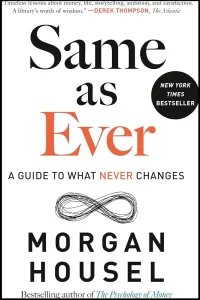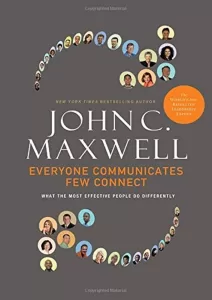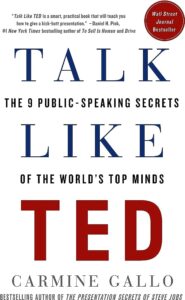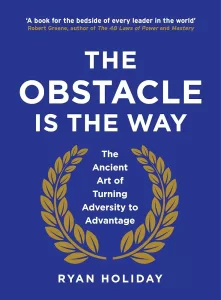Book Review: “Same as Ever”
Book: Same as Ever by Morgan Housel
Reviewer: Bobby Powers
My Thoughts: 8 of 10
Last year it felt like everyone was suddenly talking about Morgan Housel. I heard multiple podcasters and authors rave about his earlier book The Psychology of Money, so when I saw he released this new book in November 2023, I decided to check it out. Same as Ever is unique because it's focused on looking backward to help look forward. Housel investigates what trends have always been around throughout history and explains that they'll continue in the future because they're baked into human behavior.
What I Learned from the Book
Predicting the future is nearly impossible, but we don't need to blindly predict the future. We just need to become better students of history and human behavior. As Housel shows, many things never change. Humans continue to follow incentives and fall prey to selfish motivations like greed, ambition, and power. So the more we study these repeatable patterns of behavior, the more we can avoid being surprised when people make the same mistakes they've always made.
"Change captures our attention because it's surprising and exciting. But the behaviors that never change are history's most powerful lessons, because they preview what to expect in the future. Your future. Everyone's future."
Selected Quotes & Ideas from the Book
Same as Ever
- "Amazon founder Jeff Bezos once said that he's often asked what's going to change in the next ten years. 'I almost never get the question: "What's not going to change in the next ten years?"' he said. 'And I submit to you that that second question is actually the more important of the two.'"
- "What would be true in every imaginable version of your life, not just this one? Those universal truths are obviously the most important things to focus on, because they don't rely on chance, luck, or accident."
Risk Is What You Don't See
- "We are very good at predicting the future, except for the surprises—which tend to be all that matter."
- "The biggest risk is always what no one sees coming, because if no one sees it coming, no one's prepared for it; and if no one's prepared for it, its damage will be amplified when it arrives."
- "Risk is what's left over after you think you've thought of everything." -Carl Richards
- "Invest in preparedness, not in prediction." -Nassim Nicholas Taleb
The First Rule of Happiness Is Low Expectations
- "Your happiness depends on your expectations more than anything else. So in a world that tends to get better for most people most of the time, an important life skill is getting the goalpost to stop moving. It's also one of the hardest."
- "A common storyline of history goes like this: Things get better, wealth increases, technology brings new efficiencies, and medicine saves lives. The quality of life goes up. But people's expectations then rise by just as much, if not more, because those improvements also benefit other people around you, whose circumstances you anchor to. Happiness is little changed despite the world improving."
- Family Income: "Median family income adjusted for inflation was $29,000 in 1955. In 1965 it was $42,000. In 2021 it was $70,784."
- Hourly Wages: "Median hourly wages adjusted for inflation are nearly 50 percent higher today than in 1955."
- Homeownership: "The homeownership rate was 12 percentage points lower in 1950 than it is today. an average home was a third smaller than today's, despite having more occupants."
- "Today's economy is good at generating three things: wealth, the ability to show off wealth, and great envy for other people's wealth."
- "Imagine a life where almost everything gets better but you never appreciate it because your expectations rise as fast as your circumstances. It's terrifying, and almost as bad as a world where nothing gets better."
- "If you only wished to be happy, this could be easily accomplished; but we wish to be happier than other people, and this is always difficult, for we believe others to be happier than they are." -Montesquieu
- "There is no such thing as objective wealth—everything is relative, and mostly relative to those around you."
Stories Are Always More Powerful Than Statistics
- "In a perfect world, the importance of information wouldn't rely on its author's eloquence. But we live in a world where people are bored, impatient, emotional, and need complicated things distilled into easy-to-grasp scenes. If you look, I think you'll find that wherever information is exchanged—wherever there are products, companies, careers, politics, knowledge, education, and culture—the best story wins."
- "How many great ideas have already been discovered but could grow one hundred times or more if someone explained them better? How many products have found only a fraction of their potential market because the companies that made them are so bad at describing them to customers? So, so many."
- "It's not what you say or what you do, but how you say it and how you present it."
- "Some of the most important questions to ask yourself are: Who has the right answer, but I ignore because they're inarticulate? And what do I believe is true but is actually just good marketing?"
Overnight Tragedies and Long-Term Miracles
- "The most important things come from compounding. But compounding takes awhile, so it's easy to ignore."
- "Show me a new technology that was immediately recognized for its full potential and instantly adopted by the masses. It doesn't exist. A lot of pessimism is fueled by the fact that it often looks like we haven't innovated in years—but that's usually because it takes years to notice a new innovation."
- "An important fact that explains a lot of things is that good news takes time but bad news tends to occur instantly. Warren Buffett says it takes twenty years to build a reputation and five minutes to destroy one. A lot of things work just like that."
- "Progress always takes time, often too much time to even notice it's happened. But bad news? It's not shy or subtle. It comes instantly, so fast that it overwhelms your attention and you can't look away. Pearl Harbor and September 11 are probably the two biggest news events of the last hundred years. Both took about an hour to play out, start to finish."
- "Things that thrived for decades can be ruined in minutes. There is no equivalent in the other direction."
Progress Requires Optimism and Pessimism to Coexist
- "The best financial plan is to save like a pessimist and invest like an optimist."
- "That's the balance—planning like a pessimist and dreaming like an optimist."
- "In the middle is the sweet spot, what I call the rational optimists: those who acknowledge that history is a constant chain of problems and disappointments and setbacks, but who remain optimistic because they know setbacks don't prevent eventual progress."
- "The trick in any field—from finance to careers to relationships—is being able to survive the short-run problems so you can stick around long enough to enjoy the long-term growth."
- "An important lesson from history is that the long run is usually pretty good and the short run is usually pretty bad."
There Is a Huge Advantage to Being a Little Imperfect
- "The secret to doing good research is always to be a little underemployed. You waste years by not being able to waste hours." -Amos Tversky
- "But Tversky's point is that if your job is to be creative and think through tough problems, then time spent wandering around a park or aimlessly lounging on a couch might be your most valuable hours. A little inefficiency is wonderful."
- "This meshes with a Standford study that showed walking increases creativity by 60 percent."
- "The most efficient calendar in the world—one where every minute is packed with productivity—comes at the expense of curious wandering and uninterrupted thinking, which eventually become the biggest contributors to success."
It's Supposed to Be Hard
- "Everything worth pursuing comes with a little pain. The trick is not minding that it hurts."
- "This is one of the most useful life skills—enduring the pain when necessary rather than assuming there's a hack, or a shortcut, around it."
- "The safest way to try to get what you want is to try to deserve what you want." -Charlie Munger
- "If you can get your work life to where you enjoy half of it, that is amazing. Very few people ever achieve that. Because the truth is, everything comes with overhead. That's reality. Everything comes with pieces that you don't like." -Jeff Bezos
- "A simple rule that's obvious but easy to ignore is that nothing worth pursuing is free. How could it be otherwise? Everything has a price, and the price is usually proportionate to the potential rewards."
Incentives Are the Most Powerful Force in the World
- "When incentives are crazy, the behavior is crazy. People can be led to justify and defend nearly everything."
- "No matter how much information and context you have, nothing is more persuasive than what you desperately want or need to be true."
- "If you would persuade, appeal to interest and not to reason." -Benjamin Franklin
- "Show me a man who thinks he's objective and I'll show you a man who's deceiving himself." -Henry Luce
- "Incentives can keep crazy, unsustainable trends going longer than seems reasonable because there are social and financial reasons preventing people from accepting reality for as long as they can."
- "A good question to ask is, 'Which of my current views would change if my incentives were different?'"
Other Tidbits
- "Base predictions on how people behave rather than on specific events. Predicting what the world will look like fifty years from now is impossible. But predicting that people will still respond to greed, fear, opportunity, exploitation, risk, uncertainty, tribal affiliations, and social persuasion in the same way is a bet I'd take."
- "One boring thing plus one boring thing can equal one world-changing thing in a way that's hard to fathom if you don't respect exponential growth. The same thing happens in careers, when someone with a few mediocre skills mixed together at the right time becomes multiple times more successful than someone who's an expert in one thing."
- "Complexity gives a comforting impression of control, while simplicity is hard to distinguish from cluelessness."
Think you’d like this book?
Other books you may enjoy:
Other notable books by the author:
Want to become a stronger leader?
Sign up to get my exclusive
10-page guide for leaders and learners.





